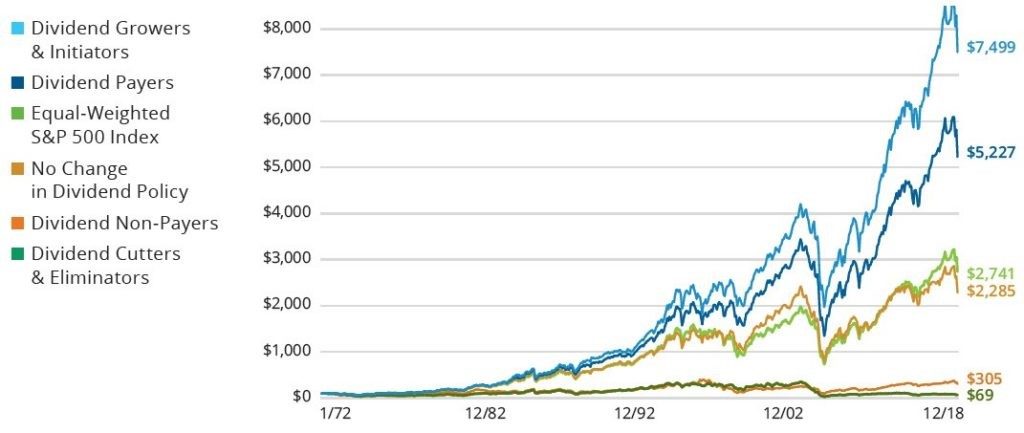
Are dividends irrelevant? Some index investors think so. However, I think they have their noses stuck in their books and have forgotten about real-life results.
Not too long ago, I watched an interesting video on YouTube which claimed that “dividends are irrelevant.” The video comes from my archenemy, Ben Felix. Ben is a financial advisor who sells ETF products and has also written a column for the Globe & Mail, a while back, which had several caveats. I, myself, have written a complete blog about Dividend Growth Investing Vs ETFs Investing in the past, but Ben just poked the bear in me, once again, with his new video.
This time, with this video, Ben just puts it plain and simple: dividends are irrelevant, when an investor is deciding where he should put his money. According to his “research,” the only way to make a good investment decision is to select ETFs. Now, let’s see how focusing solely on this financial theory is a very bad way to invest your money, in the real world. This is not Monopoly here.

The story of two great minds
The premise of many “anti-dividend” theses is based on the Modigliani-Miller theorem (or M&M, if you like… but I prefer Skittles!). According to the financial theory of these two great minds, an investor should be indifferent between investing in Company A, which is paying a $1 dividend, and Company B, with all the same metrics and fundamentals as Company A, which keeps its money in its bank account. That totally makes sense, when you look at basic math:
- Company A is worth $10 a share and makes $1 in profit. Company A pays a $0.50 dividend.
- Company B is worth $10 a share and makes $1 in profit. Company B doesn’t pay a dividend (grinch!).
- Company A loses $0.50 in value each time it pays a dividend. The shareholder sees Company A shares going up to $10.50 and receives $0.50 in cash. Total value of the investment: $11, including dividend.
- Company B keeps the $1 in profit. The shareholder sees Company B shares going up to $11. Total value of the investment: $11.
Therefore, dividends are irrelevant when choosing an investment. Not so fast M&M!
While there is no money created by the issuance of a dividend, it doesn’t make it irrelevant to your investing decisions. Dividend growth policies will tell you a lot about the company you are looking at, and this is why dividends can be relevant to your investing choices.
Dividends are an indicator, a very good one
The very first thing I look for, when I analyze a company, is what I call the dividend triangle. Most dividend growers will show a strong dividend triangle: revenue growth, earnings growth and dividend growth. These three metrics are good indicators that the company is exposed to favorable factors. In other words, it’s a great way to know if the company is:
- A leader in its market
- Has a competitive advantage
- Has developed an expertise in growth by acquisitions or focuses on a strong R&D budget to keep its edge against its peers
- Shows growth vectors
- Demonstrates a robust business model
- Generates consistent and growing free cash flow
I think you get the picture. Now, most dividend growers will have several of these characteristics. Using common sense, I would bet that, on average, this type of company will do well over the long haul. When a company is continuously making more money, it is usually liked by the market, and its share value goes up.
Therefore, by keeping track of dividend growers, you can identify great candidates for your portfolio faster. While not all dividend growers will generate the expected results, it has been proven, many times over, that dividend growth stocks can beat the market. But you don’t have to be a blind believer. You can read about index investors that prove my point!
Let’s dig the numbers
I’ll be honest. I didn’t spend dozens of hours reading financial studies, in order to prove this point. For me, it comes down to common sense which is actually backed by research. If you have any other papers that could add to the discussion (not theories, but actual results), please share them with me.
The first set of results that I found came from Vanguard, the #1 index investing advocate. In a document where Vanguard tries to convince us that dividend investing isn’t that amazing, it clearly missed the point by providing the following graph:

Source: Vanguard
During this 10-year period, dividend growth stocks not only beat the market, but they did it with less volatility.
My portfolio is built with one goal in mind: providing a comfortable and stress-free retirement. I now have the opportunity to invest in a strategy that not only beat the market, but has done it with less downfalls.
Is this an anecdote? Is it luck? Let’s go further.
The next graph, provided by Ned Davis Research, tracks stock from the early ‘70s up to 2018. Once again, it shows, clearly, that dividend growers outperform the rest of the market. We now have nearly half a century of data showing the same results.

source
Meb Faber and the dividend growth myth
All right, Meb Faber explained that Ned David Research generated this graph based on geometrically weighted indices. While this was a methodology accepted and commonly used by the industry, a while ago, the financial world has now moved to arithmetic-weighted indices. I’m not going to debate which one is better here. I’ll leave that debate for people who love reading books and studies, and think theory is king. I just want to highlight that what was once commonly accepted by the industry has changed over time (you know, theory must evolve to get closer to reality).
According to Meb Faber’s article, The Dividend Growth Myth, the new numbers show a less dramatic gap between dividend growers and the market:
“Now, with its updated return calculations, Ned Davis shows dividend growers returning 12.89%, all dividend stocks 12.83%, and equal weight S&P 500 12.35%! (All beginning in 1973.)”
Actually, 0.54% for 46 years is enough for me to pick dividend growth investing. It is a consistent difference, showing dividend growers do well. While Faber’s article is about his own investing strategy (including dividends and share buyback) showing even better results, his numbers still show that dividend growers perform better than the market.

Source: Meb Faber
I find Faber’s investing strategy interesting, but for me, tracking and determining share buyback programs has proven more difficult and time consuming than focusing on dividend growth. It proves to me that more than one strategy can work…
Can you beat the market with dividend investing?
If you’re wondering if you can beat the market and you do a quick Google search, you’ll easily find tons of studies telling you how professional investors don’t beat the market, in the long run. If you can beat the market for 5-10 years, many people will tell you that you are just very lucky (as if investing has anything to do with luck).
Back in 2017, I wrote an article about how dividend investors can beat the market. There are several constraints for professional investors that individual investors don’t face. As a DYI investor, I don’t have to charge myself a fee to manage my portfolio. I don’t have to manage $500M and calculate my trades to not affect the market when I want to use 10% of my portfolio. I don’t have to meet my boss and tell him that I lag my benchmark for a third quarter in a row.
Over the past nine years, I’ve consistently beat the market. When I look at my investment performances, I guess I’m just super lucky and my investment process has nothing to do with it. Ahem! Actually, my results have nothing to do with being a genius and nothing to do about luck either.
What dividend growth investing is really about
My overall results are probably similar to many other dividend growth investors. The “secret” isn’t a special formula or a superpower enabling me to foresee the future and systematically pick undervalued stocks that nobody saw coming.
Dividend growth investing is not about beating the market.
It’s not about making smarter investment decisions either.
Dividend growth investing is about having a clear strategy, following a straight-forward process and making trades based on concise information, to avoid paralysis by analysis. If you apply those simple rules to your portfolio, you will likely achieve your investing goals.
The post Dividends Are Relevant and Can Beat the Market appeared first on The Dividend Guy Blog.
